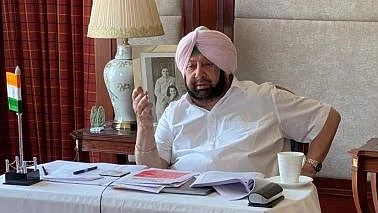Punjab Chief Minister Amarinder Singh had announced on 26 April that restrictions similar to a lockdown in the state from 6 pm to 5 am will be imposed in view of the COVID surge. Further, weekend lockdown was imposed from 6 pm on Friday, 30 April, till 5 am on Monday, 3 May.
However, as cases continue to rise, the Punjab government issued new guidelines on Monday, including the extension of the daily lockdown till 15 May.
The order also stated, “Nobody to enter the state whether by air, rail or road without either a COVID negative report or vaccination certificate.”
Here’s all you need to know about the additional restrictions imposed:
Will shops remain open?
All non-essential shops will continue to remain closed till 15 May.
Essential items include chemist shops and those dealing with supply of essential goods such as milk, bread, mobile repair, etc. Sabzi mandis will only allow vegetable and fruit wholesalers to operate, while maintaining social distancing.
No restrictions on any medical establishments.
Will government offices and banks continue to function?
Yes, all government offices and banks will continue to function at 50 percent capacity. However, no such restrictions apply to those offices engaged in COVID management.
Moreover, deputy commissioners are authorised to draft service of any official for COVID management.
What vehicles are allowed?
Four-wheeler vehicles are allowed. However, no car can seat more than two passengers at a time, including taxis.
For two-wheelers, pillion riders will only be allowed if they are from the same house or family.
Vehicles carrying patients are exempted.
How many people are allowed in gatherings?
No gathering of more than 10 people is allowed, including for weddings, funerals or cremations.
How will night curfew be enforced?
Villagers will organise ‘thikri pehras’ to ensure night curfew and weekend curfew orders are complied with.
What about religious places?
All religious places will close by 6 pm daily. The order also stated that there should be no overcrowding at temples, mosques, gurudwaras, churches, etc.
Punjab government’s order also warned those hoarding or trying to hoard oxygen, saying that action by district administration will be taken against such people. The order added that RT-PCR tests will be conducted for roadside vendors.
Appeals were made to farmer unions and religious leaders to not hold gatherings and reduce the number of protesters to token presence at petrol pumps, malls, etc.
Punjab reported 7,327 new COVID-19 cases, 5,244 discharges, and 157 deaths on Sunday. The number of active cases stand at 60,108. Total discharges stand at 3,15,845 and total death toll is at 9,317.
(At The Quint, we question everything. Play an active role in shaping our journalism by becoming a member today.)
